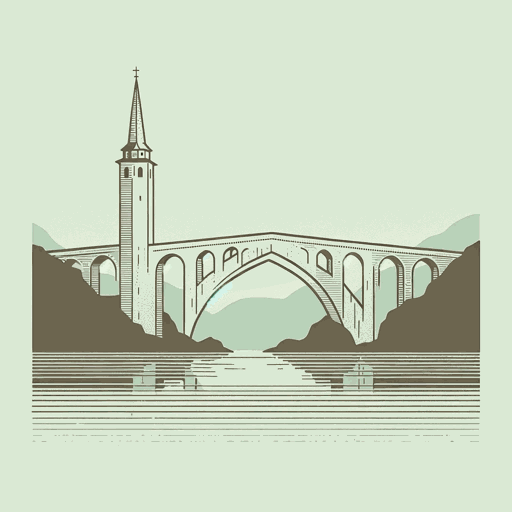43 pages • 1 hour read
Ivo AndricThe Bridge on the Drina
Fiction | Novel | Adult | Published in 1945A modern alternative to SparkNotes and CliffsNotes, SuperSummary offers high-quality Study Guides with detailed chapter summaries and analysis of major themes, characters, and more.
Important Quotes
“Here, where the Drina flows with the whole force of its green and foaming waters from the apparently closed mass of the dark steep mountains, stands a clean-cut stone bridge with eleven wide sweeping arches.”
(Chapter 1, Page 13)
The opening chapter introduces the image of the bridge over the Drina, the structure that will become a metaphor for the endurance of humanity in a turbulent locale. Even at this early stage, the near “clean-cut stone bridge” (13) is juxtaposed against the large, natural, intimidating mountains. The bridge is presented as an attempt to tame the wild geography and bring order to the chaos.
“But how many of our townsmen have, in the course of centuries and the passage of generations, sat here in the dawn or twilight or evening hours and unconsciously measured the whole starry vault above!”
(Chapter 1, Page 20)
The bridge, as described throughout the first chapter, is the center of the community in the town. As evidenced in the quote above, its value is that it provides community, trade, entertainment, and everything else to all of the people regardless of race, creed, economic status, or any other demographic marker. The bridge is a symbol of the potential unity of the town of Višegrad.
“The aga of the janissaries, with armed escort, was returning to Stambul after collecting from the villages of eastern Bosnia the appointed number of Christian children for the blood tribute.”
(Chapter 2, Page 24)
The above quote describes the Ottoman practice of devshirme, in which soldiers were sent to Christian communities in the Balkans to kidnap children as a means of tax. These children would be taken away and converted Islam, raised to be members of the military or the civil service. This disconnect between the Muslim parts of the Ottoman Empire and their Christian subjects becomes a formative moment in the history of

